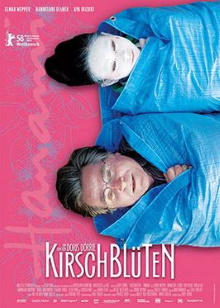This is a German film in that the production company, director and most of the cast are German but its heart and soul is Japanese. It is in fact an obvious homage to the works of Yasujirō Ozu transposed to Germany which is all well and good. But what makes it great is that it then builds on that foundation to explore the aftermath of the death of a spouse. I’m surprised that this doesn’t seem to be better known and more highly regarded and it’s true that it could stand to be a little less heavy-handed in its messaging which prevents it from being truly sublime. Still, I do believe that this is one of the favorite films I’ve watched so far this year.
Trudi Angermeir receives a diagnosis of terminal illness for her husband Rudi but decides not to tell him. She gently asks him if he wants to go to Japan to visit their son Karl but relents when he declines even though she has always loved Japanese culture and has dreamed of visiting the country. They instead visit their other two children in Berlin who don’t really have time to spare for them though Franzi, the partner of their lesbian daughter is more sympathetic. Franzi accompanies Trudi to watch a Butoh Japanese dance performance which the latter has a lifelong interest in but Trudi dislikes and doesn’t understand it. However when the elderly couple go to a Baltic seaside resort for a few days, Trudi passes away suddenly in her sleep. Rudi is distraught and while the children are similarly upset, they are unable to understand the depths of his grief. He realizes that there are parts of Rudi he never knew and that she put aside many of her own dreams and interests in living the life they had in their small Bavarian village. He therefore goes to visit Karl in Japan, perhaps as a way of making it up to her.
The first half of the film starts out somewhat slow but soon resolves into a scenario that is clearly inspired by Tokyo Story, complete with a putative daughter-in-law who acts far more kindly to the couple than their own children. It feels like a homage rather than a copy however as updating it to modern day Germany makes it feel fresh. The second half is all about Rudi trying to connect with his wife by exploring and trying to understand Japan in her stead, stepping out of his preferred predictable, unadventurous routine to do so. The film actually dives deep into using the Japanese dance form as a means of coming to terms with death as Rudi meets a young girl Yu who performs in public after her own mother’s death. The burgeoning relationship between the two, barely able to communicate with one another in halting English, could easily be misconstrued by others as being inappropriate and indeed Rudi’s children are ashamed based on what they know of their father’s final days. Yet as my wife notes, this is a profound love story as Rudi desperately looks everywhere for Trudi and finds her in Japan while Yu can be said to be acting as a sort of shaman to help him. It’s rather rare to see a film try to encompass two different cultures and do it so well.
I suspect that this film isn’t more highly regarded because its cinematography doesn’t look grand enough. I do like its choice of shots: for example switching from the pleasant countryside of Bavaria to the cityscape of Tokyo to imply that the latter is just another kind of scenery, but the quality of its photography is never quite as good as it should be. Then there is how it is too straightforward in its themes and some of its gags are too cutesy or distracting like the small joke with Yu’s name. There are plenty of subtle touches in it, like how Trudi’s daughter brushes her mother off when she touches her head, but then she does the same move to her partner. The characterization of the adult children not being able to stand being in the company of their parents for long and yet being wracked with guilt over it is spot on. Yet in other ways, such as the significance of Mount Fuji, the film is too overt and insistent.
It’s still one of the best films I’ve watched so far this year simply because the themes resonate so well with us and because pulling off a respectful homage to Ozu while also adding to it is so artistically impressive. This is great work by director Doris Dörrie and lacking only in that its craftsmanship could be better to make it more convincingly cinematic in scope.
